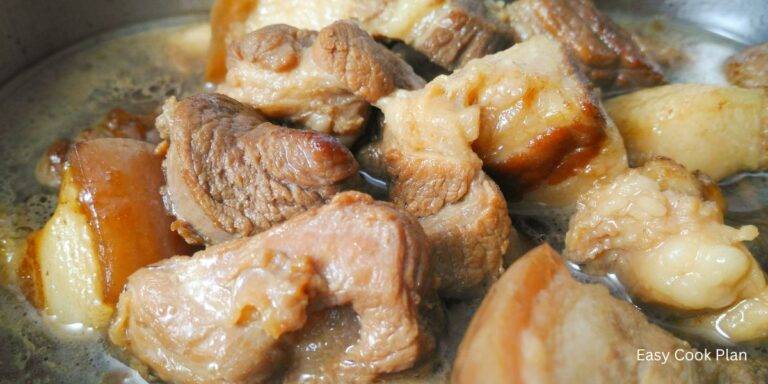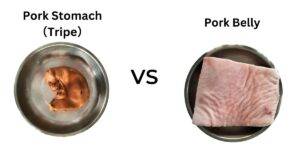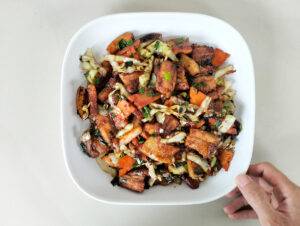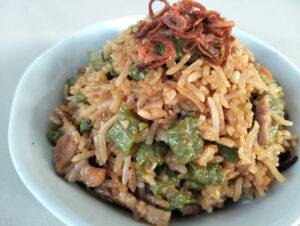Table of Contents
Why Braised Pork Belly Is Tough: Causes and Solutions
Causes and Solutions for Tough Braised Pork Belly
Hey, do you like braised pork belly? It’s one of my favorite dishes, it is easy to make, but it can be tricky to make it right sometimes. You must know how to avoid common mistakes that can make the pork belly tough and dry. Just remember the five causes of tough braised pork belly below. You are good to go.
I also provide an easy how-to guide to make any braised pork belly dish. Check that out. If you follow the step, it will hardly go wrong.
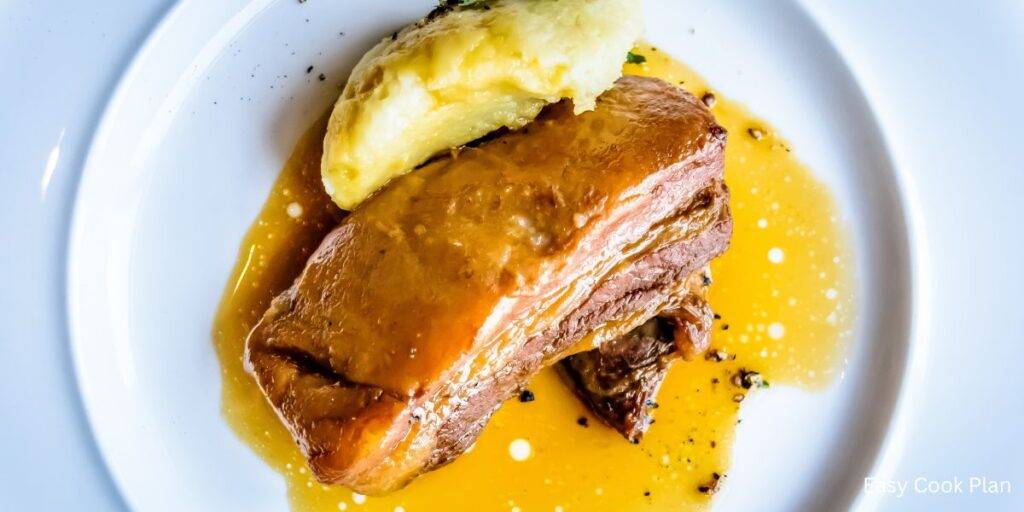
Causes of Tough Braised Pork Belly
Overcooking
Braised pork belly is a delicious dish that requires patience and skill. The pork belly should be simmered in a flavorful liquid until tender and juicy. However, the meat can become tough and dry if you cook it for too long. The meat becomes tough because the collagen and fat in the pork belly break down and evaporate over time, leaving behind tough fibers.
To avoid overcooking your braised pork belly, you should check the doneness of the meat periodically with a fork or a knife. Poke the pork belly; if it falls apart easily, it is ready to serve. The pork belly needs more cooking time if it still feels firm or rubbery.
Also, feel free to use a thermometer to check the internal temperature of the meat. It should be around 190°F or 88°C when it is done. Remember to keep the braising liquid at a low simmer, not a boil, as boiling can also cause the meat to toughen.
Undercooking
Avoid undercooking if you want to enjoy a tender and juicy braised pork belly. Undercooking can cause the meat to be tough and chewy and the fat to be rubbery and unappetizing.
To prevent this, you should cook the pork belly slowly and gently in any liquid, such as wine, stock, and spices. This will help the meat to become soft and succulent and the fat to melt and render.
Not Enough Liquid to Braise
One possible cause of tough braised pork belly is not adding enough liquid to the braising pot. The liquid is the main thing that keeps the pork belly moist and tender and creates a flavorful sauce. The pork belly can dry out and become chewy if the liquid evaporates too quickly.
To prevent this, you should check the pot once in a while and add more water or broth if needed. You can also cover the pot with a lid or foil to trap the steam and reduce evaporation.
Using the Wrong Cooking Temperature
Another common mistake when making braised pork belly is using the wrong cooking temperature. If you use the wrong cooking temperature, you might have a tough and dry pork belly that is hard to chew and enjoy. Here are two tips to avoid this common mistake and achieve the perfect braised pork belly every time:
- This one is technical. You are using a thermometer to check the temperature of the liquid in the pot. It should be between 160°F and 180°F, the ideal braising range. The meat will cook too fast and lose moisture if the temperature is too high. If the temperature is too low, the meat will not cook evenly and become rubbery.
- Adjust the heat source accordingly. If you use a stovetop, you may need to lower or raise the heat depending on how fast the liquid simmer. If you use an oven, you may need to preheat it to the right temperature and check it periodically to ensure consistency. You may also want to use a slow cooker to maintain a steady temperature for braising.
- The good rule of thumb is that if you keep the braising bubble low and gentle, you should not worry too much.
Pork Belly Size
One of the common mistakes when making braised pork belly tough is to cut the pork too big. Large chunks of pork belly take longer to cook until tender, and they may not absorb enough flavor from the braising liquid.
The ideal size for braised pork belly is about one-inch cubes, which will shrink slightly after cooking. This way, you can ensure that the pork is cooked evenly and thoroughly and that every bite is infused with a rich and savory sauce.
The smaller the size, the less time it takes to braise. Check out the braised ground pork.
Remember, size does matter when it comes to braising pork belly, so don’t cut corners and cut your pork too big!
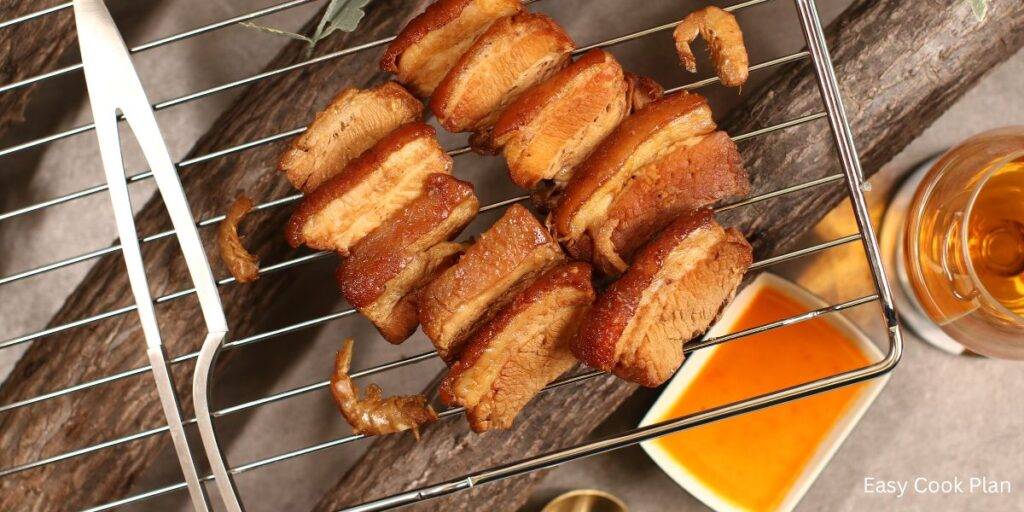
Solutions for Tender Braised Pork Belly
Choose a Good Quality Pork Belly
Look for a piece with a nice balance of meat and fat, and avoid any too lean or too fat. You want some fat to keep the meat moist but not so much that it overwhelms the dish. Just eyeball it; approximately a quarter-inch of fat on the meat’s surface seems perfect.
Season the Pork Belly Well
Before braising, you need to season the pork belly with salt and pepper and some spices or herbs optionally. You can also sear the pork belly in a hot skillet for a few minutes on each side to create a golden crust and lock in the juices. This step is optional but adds flavor and texture to the final dish.
Choose a Flavorful Braising Liquid
The braising liquid gives the pork belly its depth of flavor and richness. You can use any liquid that complements the pork, such as chicken broth, wine, beer, cider, soy sauce, vinegar, or water.
Add aromatics like garlic, onion, ginger, bay leaves, star anise, or cinnamon to infuse more flavor into the meat. The amount of liquid you need depends on the size of your pot and the pork belly, but you generally want to cover about half to two-thirds of the meat with liquid.
Braise the Pork Belly Low and Slow
The key to braising is patience. You want to cook the pork belly over low heat for a long time. The duration required to cook your pork belly can vary between 1 to 4 hours, depending on its size and thickness.
You can braise the pork belly on the stovetop, in the oven, or a slow cooker. Just check on it occasionally and add more liquid if needed.
Key Takeaways
If you want to make braised pork belly, you must be careful not to cook it too much or too little. You also have to ensure enough liquid in the pot so it doesn’t dry out. The liquid should be tasty, like wine or broth, and you should cook it on low heat for a long time. The pork belly will be soft and juicy, not tough and gross.

